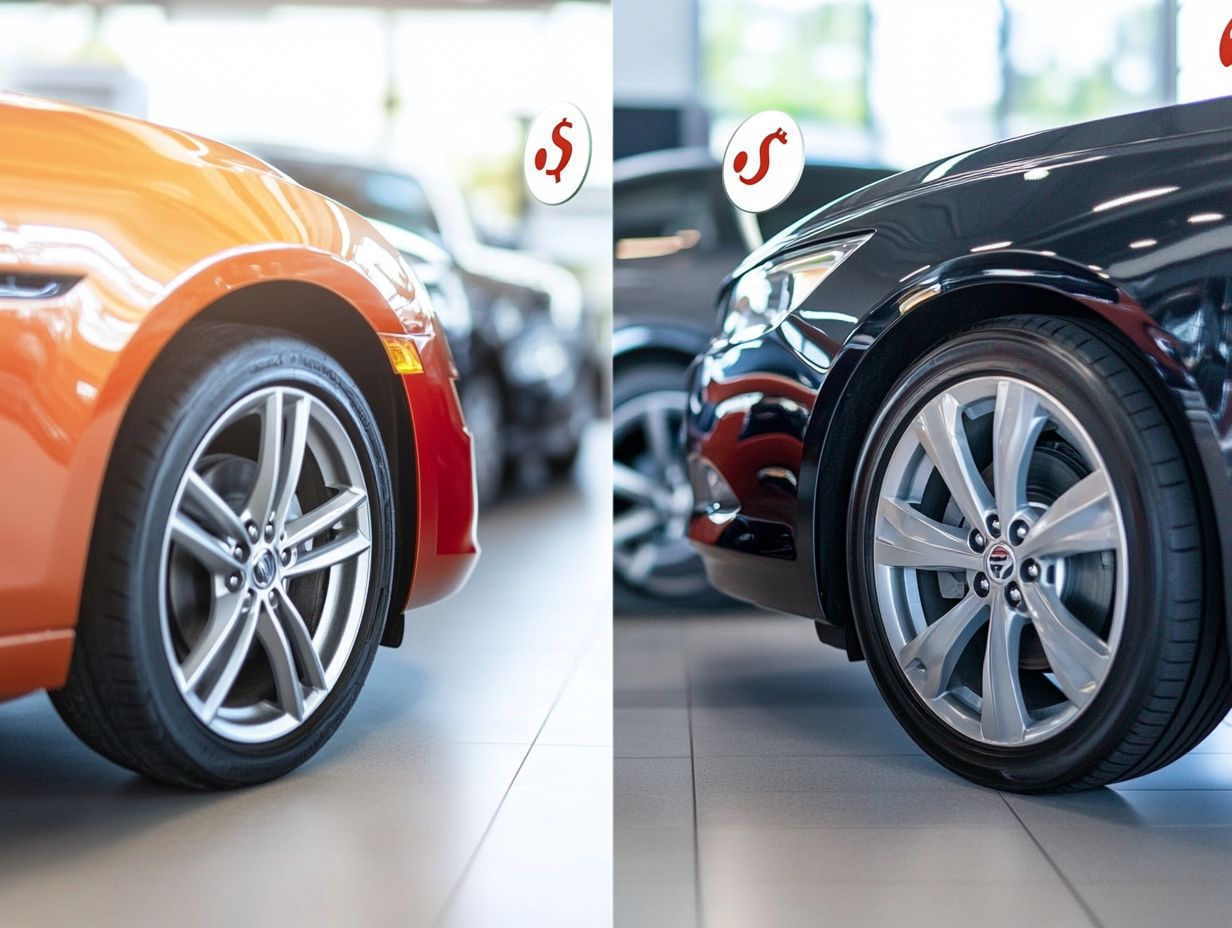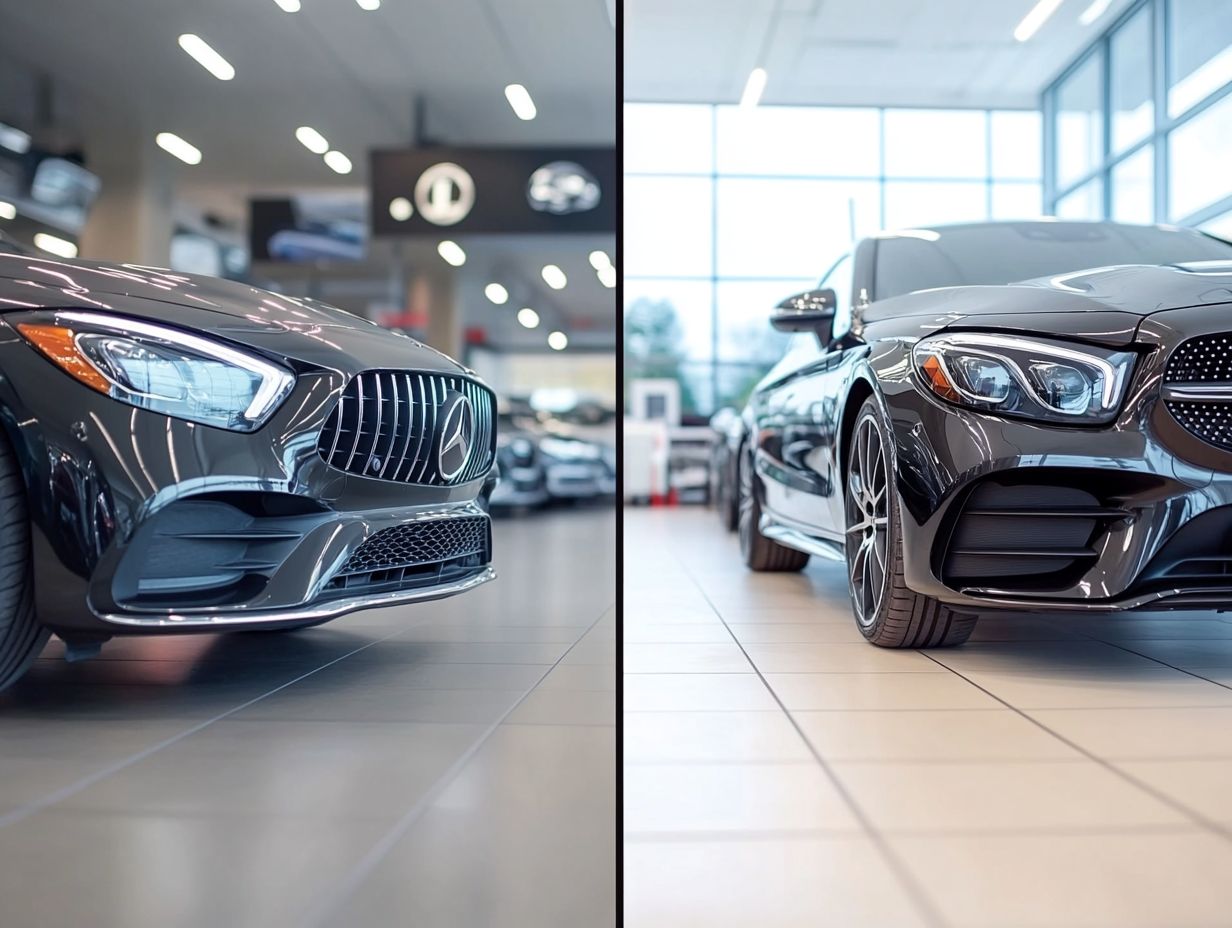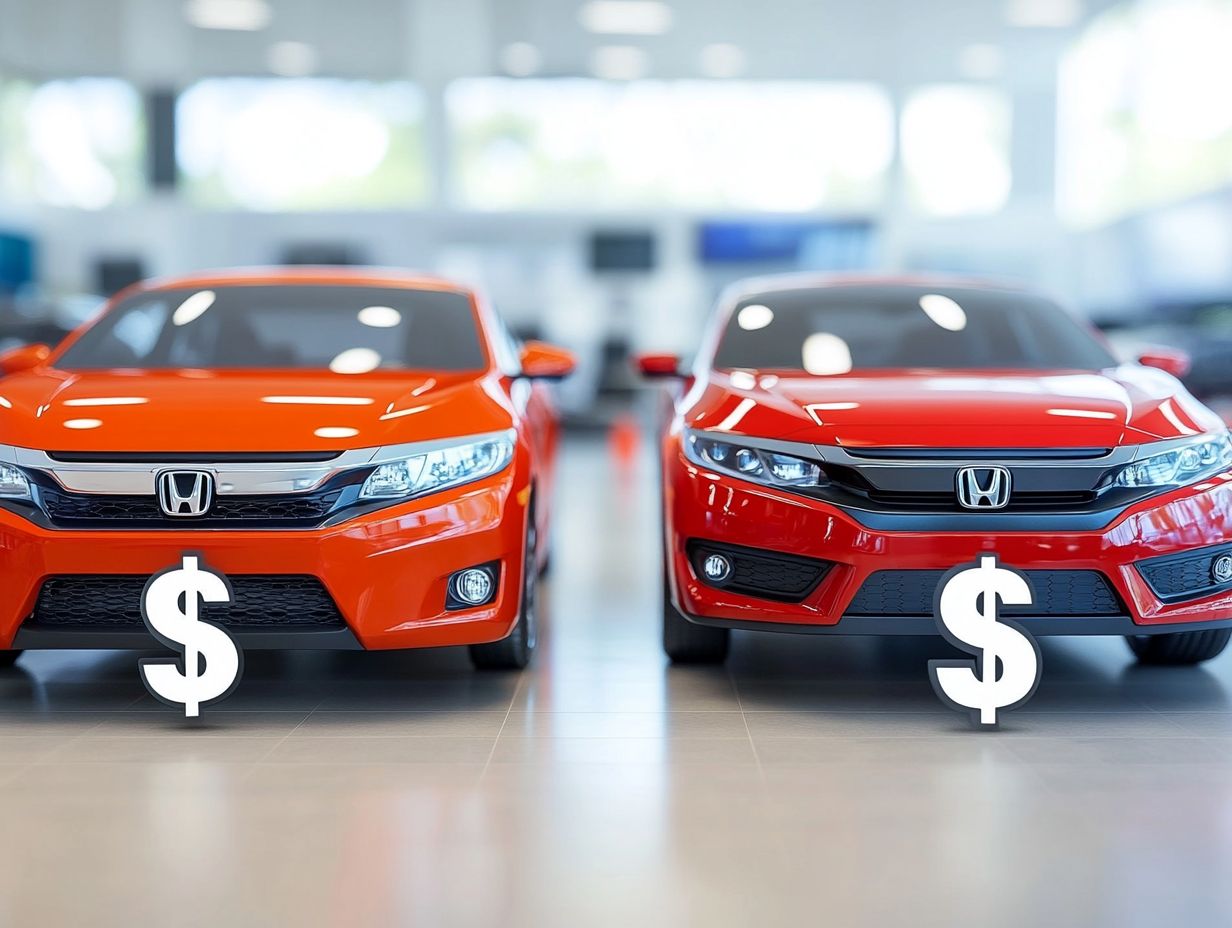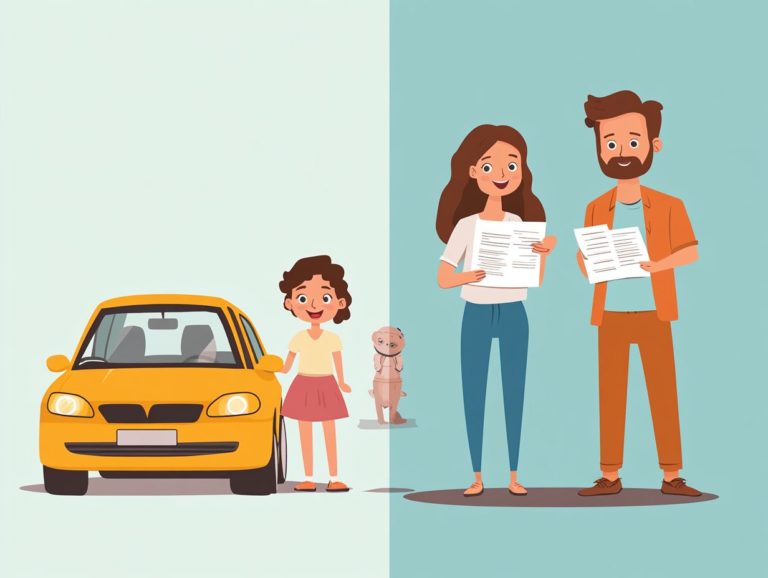5 Tips for Financing a New vs. Used Car
Deciding between a new or used car can be quite the conundrum, particularly when financing comes into play. With numerous options and factors to ponder, it s crucial to make a choice that aligns with your budget and lifestyle.
This guide offers five essential tips to navigate your decision-making process. You ll explore depreciation, maintenance costs, and resale values. Delve into the pros and cons of each option, equipping yourself to sidestep common pitfalls along the way.
Whether you re a first-time buyer or contemplating an upgrade, consider this guide as your trusted companion on this journey.
Contents
- Key Takeaways:
- 1. Consider Your Budget and Needs
- 2. Evaluate the Depreciation Value
- 3. Research Available Financing Options
- 4. Factor in Maintenance and Repair Costs
- 5. Consider the Resale Value
- Is It Better to Buy a New or Used Car?
- Frequently Asked Questions
- Smart Tips for Financing Your Next Car: New vs. Used!
- Is it better to finance a new or used car?
- What should I consider when deciding between a new or used car?
- Are interest rates different for new vs. used car loans?
- Can I finance a used car through a dealership?
- Should I put a down payment on a new or used car?
Key Takeaways:

- Before you decide on a new or used car, check your budget and needs.
- Understand how depreciation affects long-term costs.
- Explore various financing options to find the best deal.
1. Consider Your Budget and Needs
When you set out on the journey to purchase a vehicle, whether you’re leaning towards a brand-new car or considering a used one, it’s essential to carefully assess your budget. Understanding how to finance a used car purchase will profoundly shape your financial decisions and overall satisfaction.
By gaining a clear understanding of your budget constraints and thoroughly comparing the true costs of various options, you can make informed decisions. This aligns seamlessly with your financial goals and personal requirements.
Taking a closer look at maintenance costs, insurance expenses, and financing terms not only helps you craft a realistic budget. It also sheds light on the long-term financial implications of vehicle ownership.
Investing time in researching and comparing these factors can help you sidestep unexpected surprises down the road. Establishing a budget means pinpointing the essential features that matter most to you, such as fuel efficiency and safety ratings.
Keep an eye out for dealer incentives or seasonal promotions. This could save you money and make it crucial to stay informed and proactive throughout your car-buying adventure.
2. Evaluate the Depreciation Value
Understanding depreciation rates is essential when weighing the decision to buy a new car versus a used one. This factor significantly influences the vehicle’s resale value and your overall financial planning.
A new car typically loses a hefty chunk of its value within the first few years. As a buyer, you might find yourself staring at a steep decline in worth shortly after making that purchase.
On the flip side, used vehicles have usually absorbed much of that initial depreciation, making them more financially attractive. Pay attention to the vehicle’s history; elements like maintenance records and accident history can crucially affect how well the car retains its value.
Investing in a vehicle with a lower depreciation rate can lead to more favorable long-term value. This is an essential consideration for anyone looking to maximize their investment.
3. Research Available Financing Options
Thoroughly researching available financing options is essential for making sound financial decisions when purchasing a vehicle. Learning how to finance your new car purchase will empower you to secure the best possible deal.
As you explore your choices, consider credit unions, banks, and dealerships, as each offers unique advantages.
- Credit unions often provide lower interest rates and more flexible terms, making them appealing for those with less-than-perfect credit.
- Banks typically have a streamlined application process, which can be quite convenient for established customers.
- Dealerships might present promotional financing that looks attractive at first glance but could be hiding some not-so-great costs.
Grasping the key components of loan agreements like the interest rate and total repayment amount is crucial.
Navigating getting pre-approved for a loan means gathering necessary documents and comparing multiple lenders. This allows you to find the best deal before you even set foot on the showroom floor.
Start your journey to a smart car purchase today!
4. Factor in Maintenance and Repair Costs

When assessing the overall affordability of a vehicle, consider maintenance and repair costs. These ongoing expenses significantly influence your budget and financial planning, especially over the long term with reliable vehicles.
New cars come with warranties that alleviate some initial repair concerns. However, routine maintenance can still add up over time.
A used car might seem budget-friendly upfront, but maintenance costs vary widely based on the vehicle s condition and reliability.
Informed buyers understand that investing in dependable used cars can lead to considerable savings in repair costs down the road.
Setting aside a maintenance fund helps you prepare for unexpected repairs. This ensures financial burdens don t disrupt your budget. Just saving a small amount regularly can provide peace of mind and a sense of financial security.
5. Consider the Resale Value
Understanding the resale value of a vehicle is fundamental to your financial literacy. It can significantly influence your investment, especially when comparing the benefits of new versus used cars and their depreciation rates, which refer to how much value a car loses over time.
The resale value is directly tied to long-term financial benefits. Pay attention to features that enhance this aspect.
Factors like brand reputation, fuel efficiency, and advanced safety technologies increase a vehicle’s appeal in the used car market. Regular maintenance and a clean title are crucial for retaining value, as buyers often seek transparency regarding a vehicle’s history.
Older cars with updated technology often sell for more, providing you with a financial advantage as a savvy purchaser.
Is It Better to Buy a New or Used Car?
Are you ready to make a smart investment in your next car? Deciding whether to purchase a new car or a used one requires careful consideration of various factors. For first-time buyers, there are 5 tips for first-time new car buyers to keep in mind. New cars offer attractive benefits like the latest technology and comprehensive warranty coverage, while used cars provide their own advantages, including lower purchase prices and reduced depreciation rates tailored to your financial situation and preferences.
Your budget will play a crucial role in this decision. Research shows that nearly 65% of buyers prioritize affordability over new features. Lifestyle considerations also matter; for example, a family might choose a spacious used SUV to balance their needs and maintain financial stability.
Ultimately, your financial decisions reflect the importance you place on long-term investment versus immediate gratification. Many vehicles retain up to 70% of their value over five years, making them an appealing choice for those seeking value without sacrificing quality.
What Are the Advantages of Buying a New Car?
Purchasing a new car has many advantages, such as access to cutting-edge technology, extensive warranty coverage, and enticing dealer incentives that elevate your ownership experience and provide peace of mind.
Besides these perks, the reliability of new vehicles is an exciting benefit to enjoy. They are less susceptible to mechanical issues than used cars, resulting in lower maintenance costs that save you on repairs and services over time.
New car purchases often come with favorable financing terms, including lower interest rates and extended loan durations. This makes monthly payments feel much more manageable. These benefits enhance affordability and ensure a smoother, more enjoyable driving experience, making investing in a new vehicle a wise choice for many.
Act now and choose the vehicle that best fits your lifestyle and budget!
What Are the Advantages of Buying a Used Car?

One of the primary advantages of purchasing a used car is the big savings that come with lower purchase prices and a drop in a car’s value over time. This makes it an appealing option, especially if you’re budget-conscious and seeking a reliable vehicle.
You’ll also enjoy lower insurance costs. Premiums are often linked to the vehicle’s age and value. This means you make a more affordable upfront investment while reaping long-term financial benefits.
When exploring the used car market, you’ll often find vehicles with detailed histories. This allows you to make informed decisions based on previous ownership, maintenance records, and any potential accidents. Such transparency helps you select a quality vehicle and enhances your peace of mind.
What Are the Disadvantages of Buying a New Car?
While purchasing a new car brings a thrill that’s hard to resist, it’s crucial to consider the downsides as well, including the benefits of exploring ways to save money on a used car purchase.
Higher prices, rapid depreciation, and increased monthly payments can impact your financial choices and long-term budgeting plans.
Don’t forget the often-ignored costs of insurance, which can be considerably higher for new vehicles compared to their used counterparts. To navigate these expenses effectively, consider following 5 tips for finding the best new car deals. This can further strain your monthly budget, especially if you’re juggling hefty loan repayments.
Recognizing how quickly a new car can lose value sometimes as much as 20% in the first year is vital for making an informed decision. These factors collectively underscore the importance of thorough research into the total cost of ownership when considering such a significant investment.
What Are the Disadvantages of Buying a Used Car?
Buying a used car can bring its own set of challenges. You might grapple with concerns about the vehicle’s history, face potentially higher maintenance costs, and deal with limited financing options for used cars compared to new cars, complicating your buying journey.
As you consider a pre-owned vehicle, be prepared for additional hurdles. Hidden repairs or undisclosed accidents may lurk beneath the surface, potentially impacting the car’s reliability. This underscores the importance of conducting a thorough vehicle inspection.
Don t forget about the hidden costs like taxes, registration fees, and potential insurance premiums that can inflate the final price.
To navigate these issues effectively, it’s wise to engage in diligent research. Checking the vehicle’s history report, asking for service records, and consulting trusted mechanics will empower you to make an informed decision.
What Are the Common Mistakes to Avoid When Financing a Car?
Navigating the complexities of financing a car can lead you to common pitfalls. You might overlook auto loan rates, misjudge the impact of your credit score, and fail to fully grasp loan agreements. These oversights can negatively affect your monthly payments and overall financial health.
To steer clear of these missteps, conduct thorough research into various auto lender options. By comparing interest rates, loan terms, and fees, you’ll be better equipped to select a financing plan that aligns with your budget and financial goals.
Setting a clear budget before stepping onto the dealership lot enables you to assess what you can truly afford, helping you resist the temptation to overspend. Understanding the nuances of auto financing can lead you to more favorable terms and foster a healthier financial future.
Frequently Asked Questions

Smart Tips for Financing Your Next Car: New vs. Used!
1. Know Your Budget: Understand how much you can afford.
2. Explore Loan Options: Look into banks, credit unions, or dealerships to find the best rates.
3. Weigh Price vs. Depreciation: New cars cost more upfront but lose value slower compared to used cars. To minimize costs, consider these 5 ways to save on auto financing costs.
4. Get Pre-Approved: This can speed up your shopping process and improve your negotiating power.
5. Account for Extra Costs: Remember expenses like insurance and maintenance.
Is it better to finance a new or used car?
Your choice depends on your finances and preferences. New cars often cost more but offer modern features. However, if you’re considering a more budget-friendly option, it’s important to understand what to know about financing used cars, as they are cheaper but might require more repairs.
What should I consider when deciding between a new or used car?
Look at mileage, condition, and remaining warranty. Check the car s history report for any issues.
Are interest rates different for new vs. used car loans?
Yes, rates differ. New car loans usually have lower rates because they are less risky for lenders.
Can I finance a used car through a dealership?
Yes, many dealerships offer financing for both types. Research to compare rates from various lenders.
Should I put a down payment on a new or used car?
Making a down payment is wise for both new and used cars, as it lowers your loan amount and monthly payments. If you’re considering financing, check out these 5 tips for financing a salvage title vehicle for additional insights.






